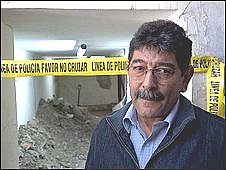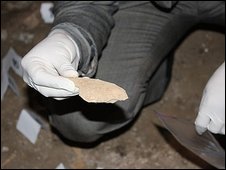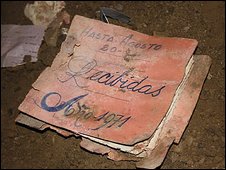Hidden cells reveal Bolivia's dark past
March 5, 2009 - BBC News
By Andres Schipani, BBC News
"There is no beginning without an end, but you will pay me back," reads an engraving on the wall of a dark and humid room in the basement of a government building in Bolivia's administrative capital, La Paz.
LA PAZ---Next to it, stains of blood drawing four fingertips seem like grim blemishes, not at all adornments.
 (right) Deputy interior minister Marcos Farfan. Marcos Farfan was tortured with electric shocks by the military regime
(right) Deputy interior minister Marcos Farfan. Marcos Farfan was tortured with electric shocks by the military regime
Bolivia is unearthing this dark part of its past.
The left-wing government of Evo Morales has recently discovered what his government calls "the horror chambers" - torture cells found by chance when contractors uncovered blocked off hallways in the basement of the Ministry of the Interior.
Those hallways led to cells where around 2,000 political prisoners were held and tortured during the 1971-1978 military rule under General Hugo Banzer.
More than 150 political prisoners "disappeared" and bones found in the basement could hold a clue to the fate of some of them.
Electric shocks
History says that, among other atrocities, electric shocks applied with a cattle prod in the genitals and teeth were common currency in those underground rooms.
The victims were left-wing militants. The perpetrators were right-wing military men under the rule of a ruthless military ruler.
"It was really a desperate situation," says Bolivia's deputy interior minister, Marcos Farfan, who after the rooms were uncovered, talked to the BBC about the horrors of the prison where he was placed in a flooded cell and electrocuted.
 (right) Bones found in the cells could hold a clue to the fate of those missing(Pic: Bolivia's Ministry of Government)
(right) Bones found in the cells could hold a clue to the fate of those missing(Pic: Bolivia's Ministry of Government)
"One wanted to grab the ceiling and escape. There was nowhere to go because the electric shocks came from the floor and you could feel the electricity in your entire body... That way they were trying to extract from you the information they needed."
Mr Farfan has been looking for these secret rooms since winning office three years ago.
He was detained and tortured in one of those rooms when he was a teenage militant in the National Liberation Army, a clandestine group created by the Argentine-Cuban revolutionary Ernesto "Che" Guevara in the late 1960s.
"So we started the works and by simply touching the walls one could feel there were empty spaces behind them," he said.
"That drove us to open up those spaces and that was when we discovered that the terror infrastructure that existed during the 70s still exists, a place where they put needles underneath my nails and applied electric shocks in my testicles and teeth."
Torture centres
Now Bolivia's government hopes the cells and hallways can provide clues to what happened in the clandestine torture centres.
There is strong evidence that torture and political murder were widespread in Bolivia in the 70s under the military government of Gen Banzer.
Earlier this week, President Morales visited the alleged torture chambers, where even the graffiti on the walls are clues to the fate of prisoners.
"There were a lot of accusations that torture chambers, underground cells, existed during the dictatorship. It's unacceptable that this has happened, certainly during the dictatorship in the 1960s and 70s. We have to investigate and I ask that the excavations continue," Mr Morales said.
 (right) Files and documents from the 1970s have been unearthed in the basement (Pic: Bolivia's Ministry of Government)
(right) Files and documents from the 1970s have been unearthed in the basement (Pic: Bolivia's Ministry of Government)
Gen Banzer, a US-trained soldier, seized power in a bloody coup in 1971 and was Bolivia's ruler until 1978.
His military rule ushered in violent repression of opponents. It is also known that the notorious Nazi-in-hiding Klaus Barbie - "The Butcher of Lyon" - was Gen Banzer's adviser in torture methods.
Widely accepted figures say that during Gen Banzer's tenure 19,000 people sought asylum in foreign countries, 15,000 were arrested, more than 8,000 brutally tortured and at least 155 disappeared without a trace.
Charges were brought in the early 80s but no-one went to trial. After the era of Latin American military leaderships ended in the late 80s, he reinvented himself as a democrat, winning the presidency in 1997.
His foes say the former hardline ruler never lost his authoritarian streak, continuing to abuse human rights and failing to help the Andean nation's poor, Indian majority even as an elected leader.
His supporters, however, say Gen Banzer did more to strengthen Bolivian democracy than any of his predecessors.
Though many praised him for embracing democracy, his past still haunted him.
'Plan Condor'
Evidence presented in 1999 linked his previous regime to the notorious "Plan Condor", which allegedly involved joint operations among South American military dictatorships in the 70s aimed at kidnapping, torturing and assassinating leftists and dissidents in Argentina, Brazil, Bolivia, Chile, Uruguay and Paraguay.
Delia Cortez, who now heads the Association of Families of the Disappeared, went into exile to Argentina in 1973 but her then-partner was "disappeared".
Now, bones allegedly belonging to some of those who vanished have been found this week in the basement rooms.
"For us this is very painful but a milestone," she told the BBC.
"We always knew some of our companions were killed there but we never had concrete proof, until now.
"Now we can begin a trial. Now we can properly search for justice. Now we can, hopefully, close this horrendous chapter."